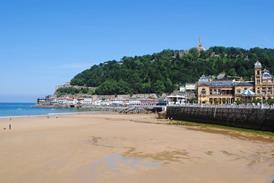Dir: Niki Caro New Zealand-Germany 2002 105min.
Whale Rider deftly melds in a spirited package a portrait of contemporary rural Maori life with a tale from its rich mythology. Avoiding the overt sentimentality that often mars coming-of-age tales, this New Zealand-Germany co-production offers something for every age group without pandering to the youngest. At the film's core is sensational newcomer Keisha Castle-Hughes, as the spiritual keeper of her tribe's founding myth. She certainly charmed audiences at the Toronto International Film Festival where the film received the AGF People's Choice Award. The prize no doubt influenced recently-launched distributor Newmarket Films, which this week acquired all North American rights. Other territories are sure to snap up this treasure for these ecologically-correct times: it's good and it's good for you.
Based on the 1988 novel by New Zealand's Witi Ihimaera (who is an associate producer) the story follows a young girl as she struggles to claim her rightful place as spiritual leader of a tribe that has been overwhelmed by modern life. Blocking her is the formidable presence of her grandfather who has no time for females in a lineage that has always been patriarchal.
An efficiently structured introduction establishes a personal tragedy with broader ramifications. Chief Koro (Paratene), disappointed with his eldest son, has staked his dream on the son's offspring to lead his people back from the brink of cultural extinction. Twins are born, a boy and a girl. But mother and baby boy die in childbirth and father disappears to wallow in grief, leaving the little girl to be raised by her grandparents and a doting uncle. As she grows up, Pai (Castle-Hughes) knows without knowing that her destiny is in the sea, as the whale rider who will guide the Whangara people to better times. But Koro, a slave to custom and tradition, is wilfully blind to her obvious potential. He rebuffs her efforts to learn the tribal customs he is teaching to village boys and is absent during her finest moments at school, where she excels in Maori oration. And yet she persists.
Castle-Hughes is a piece of casting genius. She inhabits the character utterly, never hitting a false note, no mean feat in a role that requires her to spar with male rivals, deliver a heartbreaking speech in Maori and ride on an animatronic whale. Her co-stars, if less impressive, do nothing to undermine the show. Caro's adaptation intensifies the emotion and pace of the source material and she peppers the script with pointed humour that keeps the film grounded in reality. If the character of Koro wavers confusingly between affection and disaffection for the child, his coming-to-terms with his granddaughter's gift yields an emotional closure that guarantees strong word-of-mouth.
This is a film that had to wait for the creation of animatronic whales. At the film's climax, a pod of humpbacks, responding to Pai's calls, beach themselves along the grandfather's shoreline. The result is a convincingly realised interactions between sea mammal and human, as Koro and his people struggle fruitlessly to save the great beasts. More impressive still, is the sequence where Pai rides a humpback under the sea. The exotic characters and locations round out an appealing family package that is refreshing in its emotional depth and rejection of syrupy melodrama.
Prod co: South Pacific Pictures, ApolloMedia
Co-prod: Pandora Film
Int'l sales: The Works
Exec prod: Bill Gavin, Linda Goldstein Knowlton
Prods: Tom Sanders, John Barnett, Frank Hubner
Scr: Caro, based on the novel by Witi Ihimaera
Cinematography: Leon Narbey
Prod des: Grant Major
Ed: David Coulson
Music: Lisa Gerrard
Main cast: Keisha Castle-Hughes, Rawiri Paratene, Vicky Haughton, Cliff Curtis, Grant Roa
















![[L-R]: Amanda Villavieja, Laia Casanovas, Yasmina Praderas](https://d1nslcd7m2225b.cloudfront.net/Pictures/274x183/6/4/1/1471641_pxl_20251224_103354743_618426_crop.jpg)


No comments yet